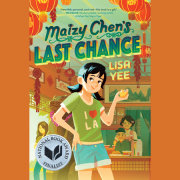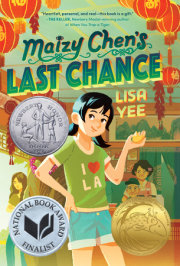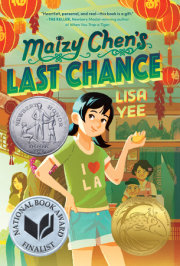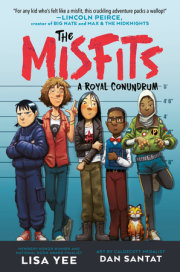Chapter 1
The pies were fake, but my grandparents didn’t know that. Not at first, anyway. My mother had invited them to watch her work on a Tasty Flaky Pie Crust commercial. When I first started going with her to the set, Mom told me, “As a food stylist, my job is to make sure everything looks good for the camera.”
Oma and Opa showed up directly from the airport wearing matching airplane pillows around their necks. My job was to make sure they didn’t get into trouble.
My grandmother’s luggage had barely touched the floor when she rushed over and, in her excitement, practically knocked me down. Oma’s hug felt awkward partly because of the neck pillow and also because, even though I was eight years old, it was the first time I’d met her in person. My best friend thinks it’s weird that I don’t know my grandparents that well. Her family is really close.
“It’s complicated,” I’ve tried explaining to Ginger. But the truth is, I don’t understand it myself. My mom and I talk about almost everything, but when it comes to her relationship with her parents, that’s a different story.
On the set, Opa beamed brighter than the soundstage lights dangling overhead. “Maizy, you’re so big!” my grandfather kept repeating before he got distracted by the pretend kitchen with only one wall.
That’s when Oma pointed to a tight circle of people. “Shouldn’t they be working?” she asked. “Why aren’t they working?”
Mom stood calmly in the middle while the director yelled, “Charlotte, I need practice pies, now!”
“You’ll get your pies,” Mom said, motioning to the two-dozen pies lined up on folding tables.
Some were fully baked, others were ready for the oven, preparing for their close-ups. My grandparents watched in shocked silence as Mom’s perfectly rounded scoops of mashed potatoes stood in for vanilla ice cream, since potatoes don’t melt. Instead of milk, glasses were filled with glue because that looks better on camera.
Oma and Opa are in the food business, too. They own the Golden Palace. That’s their Chinese restaurant in Last Chance, Minnesota. Mom once told me, “Maizy, you’re the last of the Last Chance Chens.” That seemed weird, since I’d never even been there.
I leaned in to eavesdrop as my grandparents began to whisper.
“Where did Charlotte learn that?”
“Not from us!”
“It’s not real food.”
When Mom topped the pies with a can of shaving cream instead of whipped cream, Oma looked like she had just seen a zombie.
It was all too much. My grandmother grabbed her suitcase with one hand, and my grandfather with the other. “Come on, we’re going home!”
“But we just got here--” Opa protested. By now he had noticed that the back of the oven was missing and that there was a camera inside it.
Before he could say anything more, Oma kissed the top of my head. “We love you, Maizy. Come visit us!”
That was the last time I saw my grandparents. Until today.
Chapter 2
An elderly woman is sweeping the sidewalk with a bamboo broom.
“Oma?” I call to her.
My grandmother drops the broom and clutches her heart. The huge black bear sculpture that towers over her makes me nervous.
“Opa!” she cries into the Golden Palace restaurant. “Our Maizy has arrived!”
From inside, a man’s shaky voice calls out, “Maizy? Maizy, come here so I can look at you!”
“My little Maizy,” Oma says. This is ironic, since my grandmother is only a couple of inches taller than me. “You’ve finally decided to visit!”
I don’t tell her I didn’t have a choice. She looks much happier today than the last time I saw her, three years ago, on the Tasty Flaky set. That commercial landed Mom on the cover of Food Stylists Monthly, but what she remembers most about it is that her parents left without even saying hello.
A boy on a battered bike glides past, then circles around, slamming on his brakes. Doesn’t he know it’s rude to stare?
I tiptoe past the scary bear and hear my mother clearing her throat. She’s leaning against our Honda with her arms crossed. An assortment of smashed bugs grace the windshield, casualties of our three-day road trip from Los Angeles.
“Hello, Mom.” My mother lowers her sunglasses. “Maizy didn’t drive herself to Last Chance. I’m here, too.”
Chapter 3
When I step inside the Golden Palace, the smell of sautéed garlic and ginger reminds me that I haven’t eaten in over two hundred miles and I’m starving! I look around in wonder. Red Chinese paper lanterns dangle from the tin ceiling. An old American flag with stars missing hangs near a fancy gold key displayed on the wall.
The restaurant is empty except for an ancient-looking lady sitting at the center table. She’s watching us like we’re a reality television show.
“Maizy, over here!”
I follow the sound of coughing. Near the kitchen, propped up in a wheelchair, is my grandfather. I smile, but his skinniness startles me. In the photos, he has a big belly.
Mom and Oma have emailed pictures back and forth for as long as I can remember, and we talk on the phone. We tried video chatting once, but it didn’t go well. All my mother and I could see was the ceiling while Opa kept saying, “Is this on? How do you turn it on?” The emails and photos stopped a few months ago when their computer broke.
“Hey, Dad.” My mother’s voice is gentle. She kneels to talk to him. “How are you?”
“Fine! Good! Fit as a fiddle!” Opa grabs Mom’s faded Dodgers cap. Her black hair tumbles down to her shoulders, making her look younger than she is. Opa’s hair is silver, and even though he’s in his eighties, he doesn’t have many wrinkles.
“They make me sit in this dumb wheelchair all day just because they think I’m going to die soon.” Opa winks at me.
Am I supposed to laugh?
Oma hugs me again. “Ignore that old goat!”
“Dad, really!” my mother protests. “You shouldn’t say things like that.”
We had so much fun driving cross-country, laughing nonstop and yelling out quotes from our favorite movies, like “Inconceivable!” from The Princess Bride and “There’s no place like home” from The Wizard of Oz. But the closer we got to Last Chance, the quieter Mom became. She didn’t even talk the last hour. My grandfather is the reason we’re here.
“How are you feeling?” Mom asks.
Opa’s eyes slowly shut. His body jerks. What do I do?! I turn to Oma, who says, “Maizy, you look hungry. Are you?”
“Call an ambulance,” my mother shouts. “Dad, speak to me!”
“What?” He opens one eye, then the other, and says to Mom, “Gotcha, Charlotte!” Opa grins at me, and I find myself grinning back, even though my mother is not.
In the middle of the chaos, a customer walks in.
Oma hurries over and hands the man a red menu. Some of the letters have worn off, so the front reads: olden Pal ce.
“Is this authentic Chinese?” The big man loosens his tie and deflates.
My grandmother nods. “Absolutely! All our dishes are from ancient Chinese recipes.”
“Good!” He shuts the menu. “Bring me chop suey and those cream cheese wontons. Chinese food has to be the real deal, or why even bother, right?”
Chapter 4
Oma motions for me to follow her into the kitchen. Fat bags of rice, boxes of fortune cookies, and gigantic jugs of soy sauce rest on metal shelves.
“Chop suey,” she says, snorting. “That’s not real Chinese food.” She stops to hug me again. “Maizy!”
My grandmother reaches for a giant cleaver. I flinch, then marvel, as she dices pork, celery, and mushrooms with lightning speed. Using the sharp edge of the blade, Oma slides everything into a hot wok with minced garlic sizzling in oil. The flames roar so high I leap back. The smell makes my mouth water.
She pivots like LeBron James, dunking wontons into the deep fryer. Magically, they morph from white to a golden brown. Oma hands me one to munch on as she slides the chop suey from the wok onto a heavy white plate. I’m worn out just from watching her.
I fan my mouth. “I’ve never heard of cream cheese wontons before.” It’s sooo good--crispy on the outside, smooth and creamy on the inside.
“Dairy products are big in Minnesota,” she explains, arranging the plates of food on a big, round black tray.
“So are these Chinese or American?” I ask.
“Yes,” Oma answers.
Once the customer is fed, she cooks for me and Mom while Opa shares a cup of tea with the ancient lady.
“Maizy, sit,” Oma insists. “It’s time to eat.”
We feast family-style on platters of chow fun noodles with char siu--barbecue pork--and fried rice with shredded omelet, snow peas, and curls of carrots. Steam rises from the spicy braised eggplant with minced pork.
I’m so hungry, but when I pick up the noodles with my chopsticks, they end up on my lap instead of in my mouth. “Oma, may I have a fork, please?”
“Chinese food should be eaten with chopsticks!” she says. I feel myself shrinking until she winks and slips me a fork. “Don’t tell Opa!”
After we finish eating, I explore the restaurant, leaving Mom and Oma to talk in loud, angry whispers.
“It took you long enough to get here.”
“I drove as fast as I could without getting a ticket.”
“No, I mean it took almost thirty years.”
I can’t believe we came all this way just for them to argue. My mom almost never gets upset--but when she talks to Oma or Opa, her voice can get tense. I distract myself by looking at the pictures and memorabilia that cover the Golden Palace’s walls. It’s like a museum in here, only with tables, mismatched chairs, and food instead of art. Wait. Mom tells people she works in the culinary arts--so maybe food is art, after all.
A faded photograph of a young Chinese bride is in a silver frame. A Golden Palace menu advertises full meals for fifteen cents. A poster of Hawaii seems out of place.
I wander into the little office off the kitchen. There’s a pile of bills stacked on the desk and photos tacked up on the wall. Dozens of them, all of Chinese men. The people in the pictures look young, but the photos are really old. Tucked in a corner is a handwritten note. It’s so faded I can barely read the words: I am a Chinese American.
“Come on, Maizy. Let’s go get settled.” Mom sounds weary.
The boy on the bike is still outside. We eye each other but don’t say anything.
Oma makes a tsk sound when she spots the fast-food wrappers littering the floor of our car. “The house is unlocked. Do you know how to get there?”
My mother releases a sigh that’s been building ever since we left California, or maybe even before. “I used to live there, remember?”
Chapter 5
It seems like the engine just started and already we’re pulling up to a white house with a red door. Our neighbors, the Zangs, have a red door, too. Chinese people think red is good luck.
While Mom is wrestling with our luggage, I grab a bag and dash inside. All the furniture looks comfy but old. Our house is really trendy, and we even have an expensive designer couch that no one’s allowed to sit on. Here, there’s a painting of dogs playing poker in the living room, and all the photos on the wall going up the stairs are of me. When I get to the top, I’m faced with my most recent school picture--the one where I refused to smile because of my braces. Dork.
A handwritten sign on a door warns, KEEP OUT OR ELSE! I take my chances. Mom’s room doesn’t look like the rest of the house. The purple dresser matches the purple canopy bed. One patch of wall has puffy stickers all over it. My mother would kill me if I put up stickers in my room.
There’s a red typewriter on the small desk. The bookshelves are crammed with Judy Blume paperbacks and Mad magazines. A prom photo is on the bulletin board. Mom’s got frizzy hair and is standing next to a boy with a goofy smile. The two of them look deliriously happy, like they’re sharing a secret.
“Asian perm.” Mom drops my suitcase next to the beanbag chair. “I wanted to look like all the other girls with their curly hair, but my hair rebelled. Maizy, you can stay in my room.”
“Really? I’d love to!”
Mom picks up an old Polaroid camera. “Smile!”
We’re both surprised when it flashes and spits out a photo. She hands me the Polaroid, and I watch my image slowly come into focus.
“Honey, there’s something I need to tell you.”
I hold my breath. Whenever people say they “need to tell you something” instead of just saying it, it’s never good.
My mother looks down at her hands. “Opa is much sicker than I realized.”
When Mom got the phone call from Oma, I could hear her crying. “Why didn’t you tell me? Why did you wait?”
That was last Wednesday. On Thursday, Mom rearranged her work schedule and canceled my summer camp. By Friday, we were on the road. Today is Sunday.
Apparently, Opa had been sick for a while, but they didn’t tell us until last week because Oma didn’t want to be a bother--and Opa didn’t want anyone to know. Ginger’s abuela loves to share every little ache and pain and has been known to make up a few. In my family, sometimes what’s not said takes up more space than what is.
“How sick is he?” I ask. Other than the wheelchair and being so skinny, Opa seems fine. He laughs and jokes a lot. Would someone who’s really sick do that?
Mom flops onto the bed and talks to the ceiling. “I’ll be the one taking him to the doctor so I can get some solid information. It’s impossible to pry a straight story out of your grandmother. I’m sure he’ll get better soon enough.”
“Like in a week? Two weeks?”
“More like a month, maybe even two months. Maizy, I honestly don’t know. It’ll be an adventure!” My mother sounds cheerful and looks worried. She’s always been excellent at multitasking.
Two months? Wait! That’s almost the whole summer. I’m supposed to have fun during vacation, not be stuck in Last Chance. I know I should feel bad for Opa, but the person I’m feeling most sorry for is myself.
Copyright © 2022 by Lisa Yee. All rights reserved. No part of this excerpt may be reproduced or reprinted without permission in writing from the publisher.









